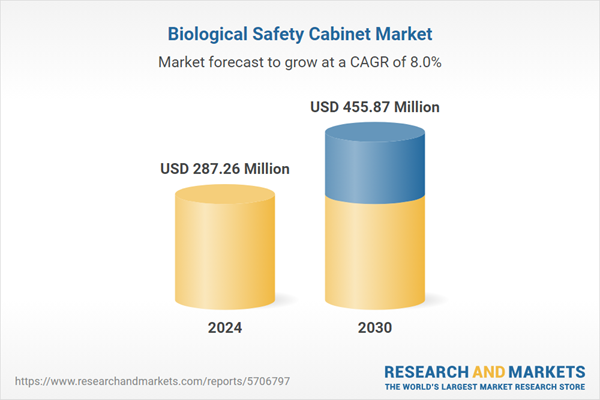Speak directly to the analyst to clarify any post sales queries you may have.
10% Free customizationThis report comes with 10% free customization, enabling you to add data that meets your specific business needs.
Biological Safety Cabinets is also known as biosafety cabinets. It is an enclosed ventilated workspace that enables safety working with elements contaminated with pathogens, which requires a designated biosafety level. The other factors supporting the market’s growth are the growing demand for personalized medicine for the treatment of chronic diseases, and the growing aging population with chronic diseases. Moreover, the rise in the research and development activities in the medical sector and the rise in the adoption of various new technologies are the contributing factors to the growth of the market.
Key Market Drivers
Escalating Awareness of Lab Biosafety in Pathogen Research
The recent focus on high-risk pathogen handling - especially following outbreaks such as COVID-19, Ebola, and anthrax lapses - has catalyzed a global push towards safer laboratory environments. Biosafety cabinets are central to these efforts, offering primary containment to reduce staff exposure and environmental pollution. In the United States, repeated audits by the CDC and Department of Health have highlighted biosafety lapses, prompting reforms and procedural overhauls.International bodies such as the World Health Organization (WHO) also stress strict biosafety practices. For example, in 2023 WHO supported certification training in Nepal to strengthen national biosafety capacity. As pandemic preparedness becomes a policy priority, national health agencies are investing in BSCs - especially Class II and III - to ensure safe handling of emerging pathogens. Such measures align with recommended biosafety upgrade plans and global health compliance frameworks, boosting BSC market demand.
Key Market Challenges
High Initial and Operational Costs
Despite regulatory backing, cost remains a barrier for many laboratories. Advanced Class II and III units - with HEPA filters, air handling ducting, and smart electronics - can be prohibitively expensive, especially in resource-limited settings. Even after purchase, recurring costs related to HEPA filter replacements, airflow testing equipment, and annual NSF/ANSI certifications add up.Improper or inadequate installation, lack of trained personnel, and budget constraints can reduce compliance. As noted in Southeast Asian labs, ~30% of BSCs were found to be mis installed or improperly maintained. Without sustained funding, especially in low-income institutions, these safety-critical systems may lapse into disuse or underperformance - posing regulatory and biohazard risks.
Key Market Trends
Innovation in Smart, Energy-Efficient BSC Designs
A major ongoing trend is the rise of smart, energy-efficient biosafety cabinets. Manufacturers are integrating digital airflow monitoring, automated sash control, and IoT-enabled alerts for filter replacement or airflow disruptions. Some advanced models self-adjust airflow when idle, reducing energy usage by up to 30%, along with LED lighting and efficient motors that further cut operating costs.Cabinets designed to fit in space-constrained microbiology or pharmaceutical labs - often with laminar and containment airflow modes - are gaining popularity. These smart and sustainable innovations align with institutional goals to improve safety while minimizing carbon footprint and operational expense, signaling a shift toward eco-conscious laboratory design.
Key Market Players
- Thermo Fisher Scientific, Inc.
- Labconco Corp.
- NuAire, Inc.
- The Baker Company, Inc.
- Haier Biomedical (Qingdao Biomedical Co., Ltd.)
- Cruma S.A.
- Jinan Biobase Biotech Co. Ltd.
- Azbil Telstar
- Germfree Laboratories, Inc.
- Air Science, Inc.
Report Scope:
In this report, the Global Biological Safety Cabinet Market has been segmented into the following categories, in addition to the industry trends which have also been detailed below:Biological Safety Cabinet Market, By Type:
- Class I
- Class II
- Class III
Biological Safety Cabinet Market, By End User:
- Pharmaceutical & Biopharmaceutical Companies
- Diagnostics & Testing Laboratories
- Academic & Research Organizations
Biological Safety Cabinet Market, By Region:
- North America
- United States
- Mexico
- Canada
- Europe
- France
- Germany
- United Kingdom
- Italy
- Spain
- Asia-Pacific
- China
- India
- South Korea
- Japan
- Australia
- South America
- Brazil
- Argentina
- Colombia
- Middle East and Africa
- South Africa
- Saudi Arabia
- UAE
Competitive Landscape
Company Profiles: Detailed analysis of the major companies present in the Global Biological Safety Cabinet Market.Available Customizations:
With the given market data, the publisher offers customizations according to a company's specific needs. The following customization options are available for the report.Company Information
- Detailed analysis and profiling of additional market players (up to five).
Table of Contents
Companies Mentioned
- Thermo Fisher Scientific, Inc.
- Labconco Corp.
- NuAire, Inc.
- The Baker Company, Inc.
- Haier Biomedical (Qingdao Biomedical Co., Ltd.)
- Cruma S.A.
- Jinan Biobase Biotech Co. Ltd.
- Azbil Telstar
- Germfree Laboratories, Inc.
- Air Science, Inc.
Table Information
| Report Attribute | Details |
|---|---|
| No. of Pages | 180 |
| Published | August 2025 |
| Forecast Period | 2024 - 2030 |
| Estimated Market Value ( USD | $ 287.26 Million |
| Forecasted Market Value ( USD | $ 455.87 Million |
| Compound Annual Growth Rate | 8.0% |
| Regions Covered | Global |
| No. of Companies Mentioned | 10 |









